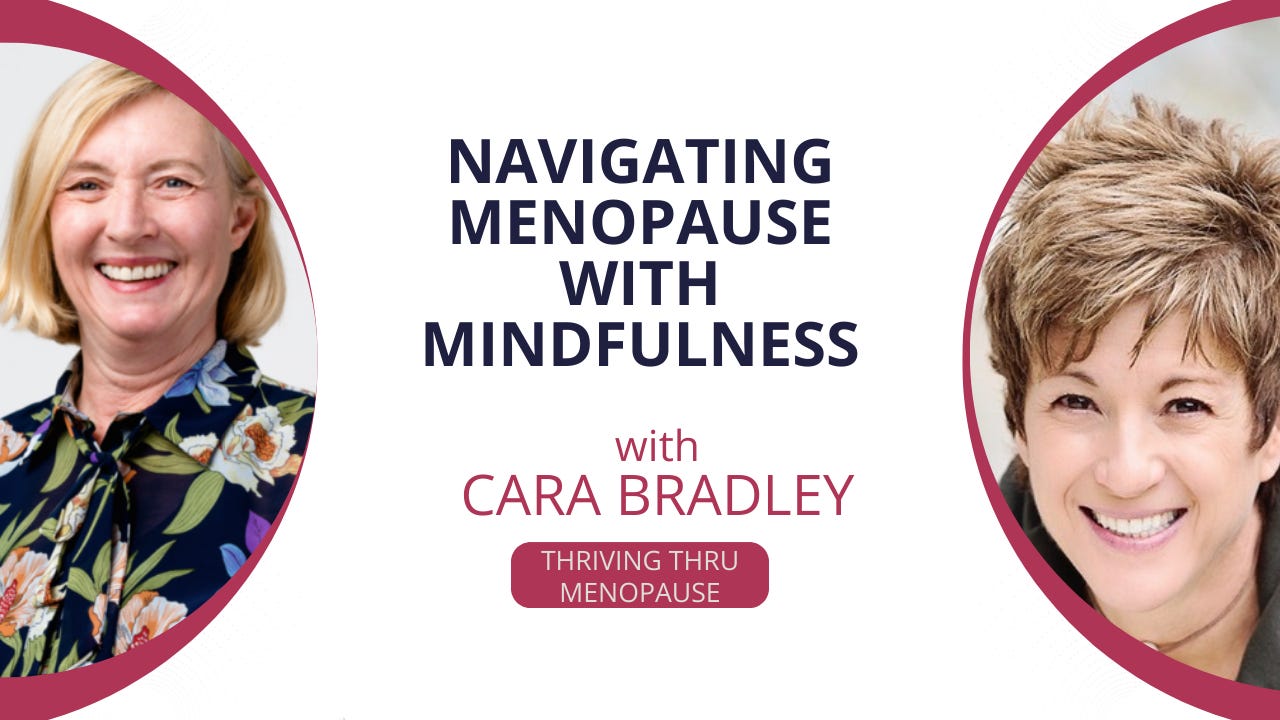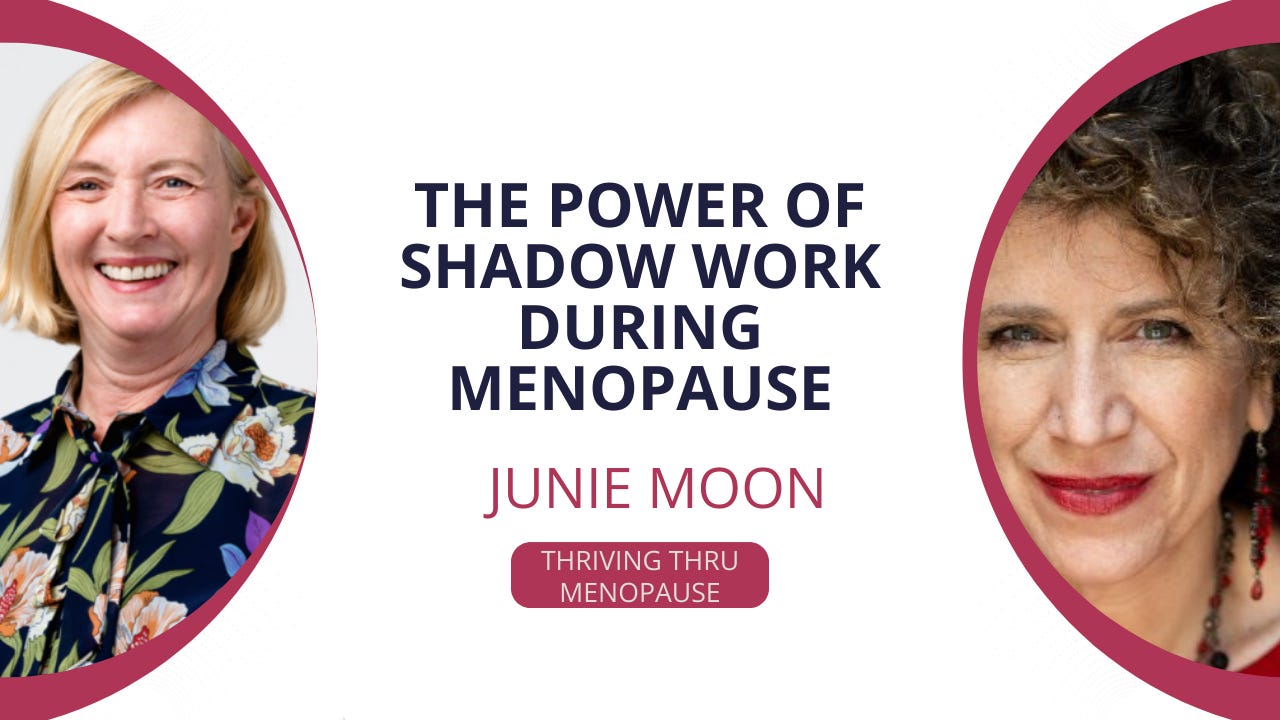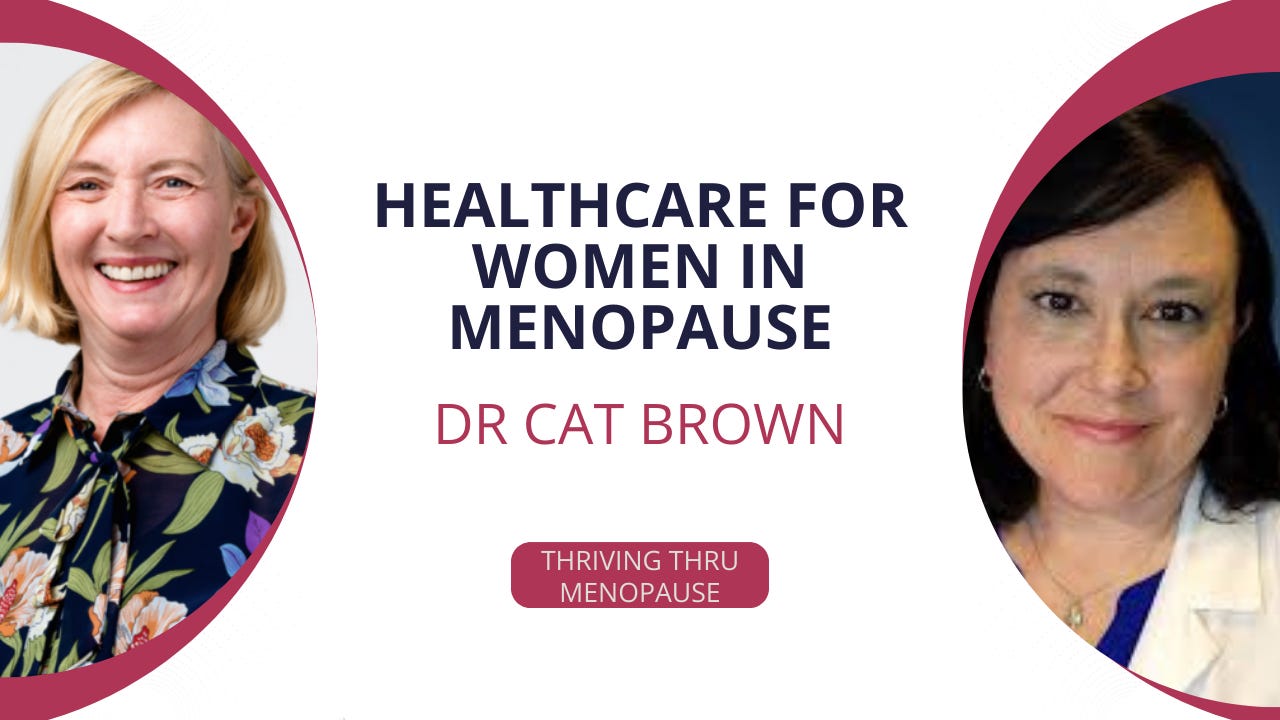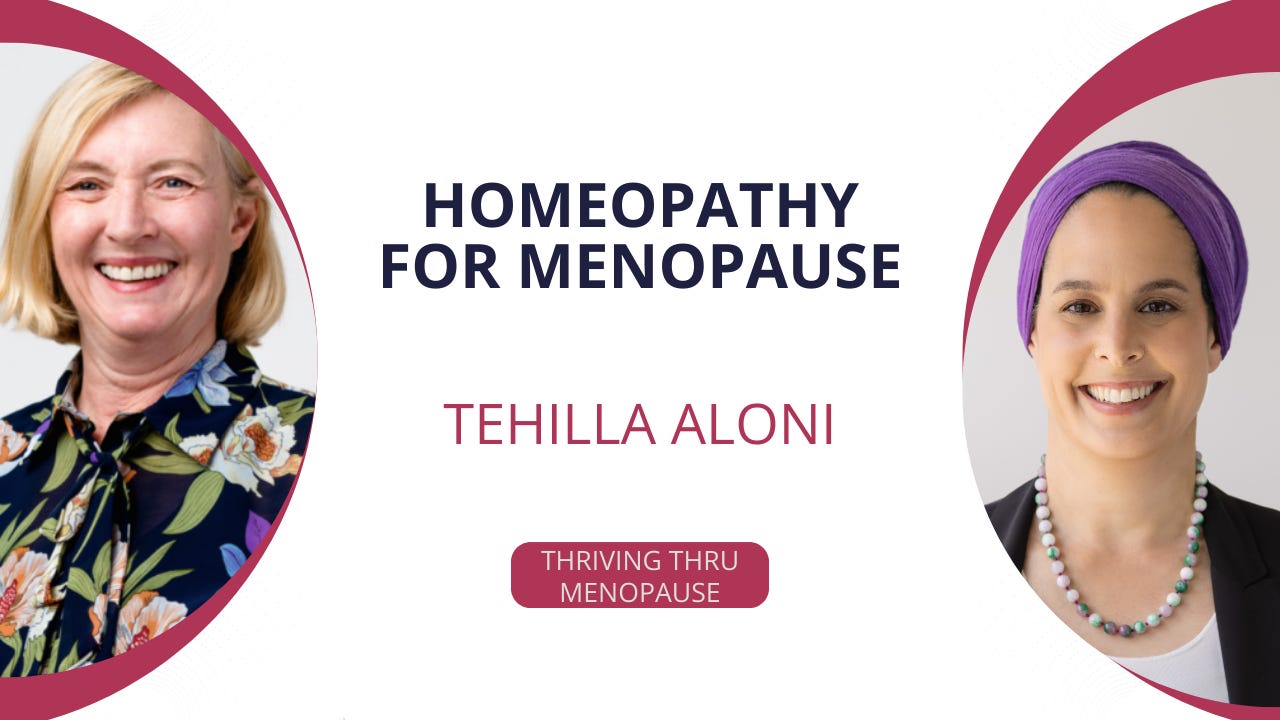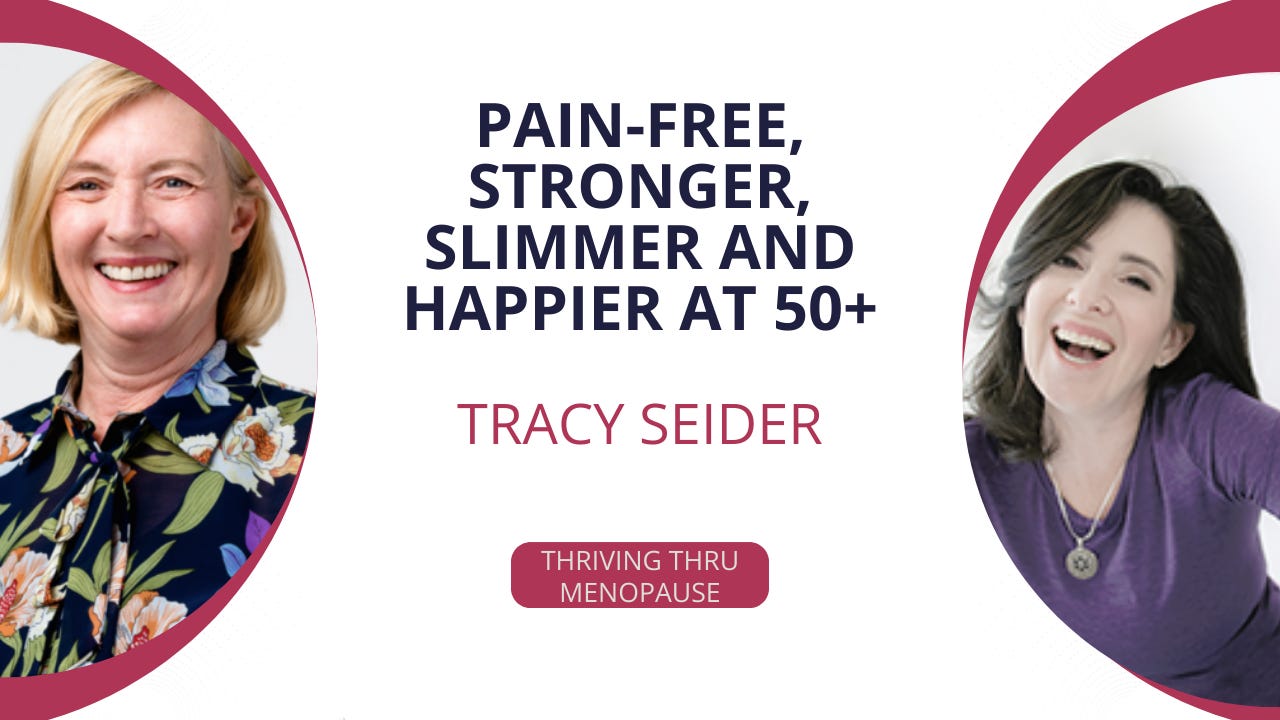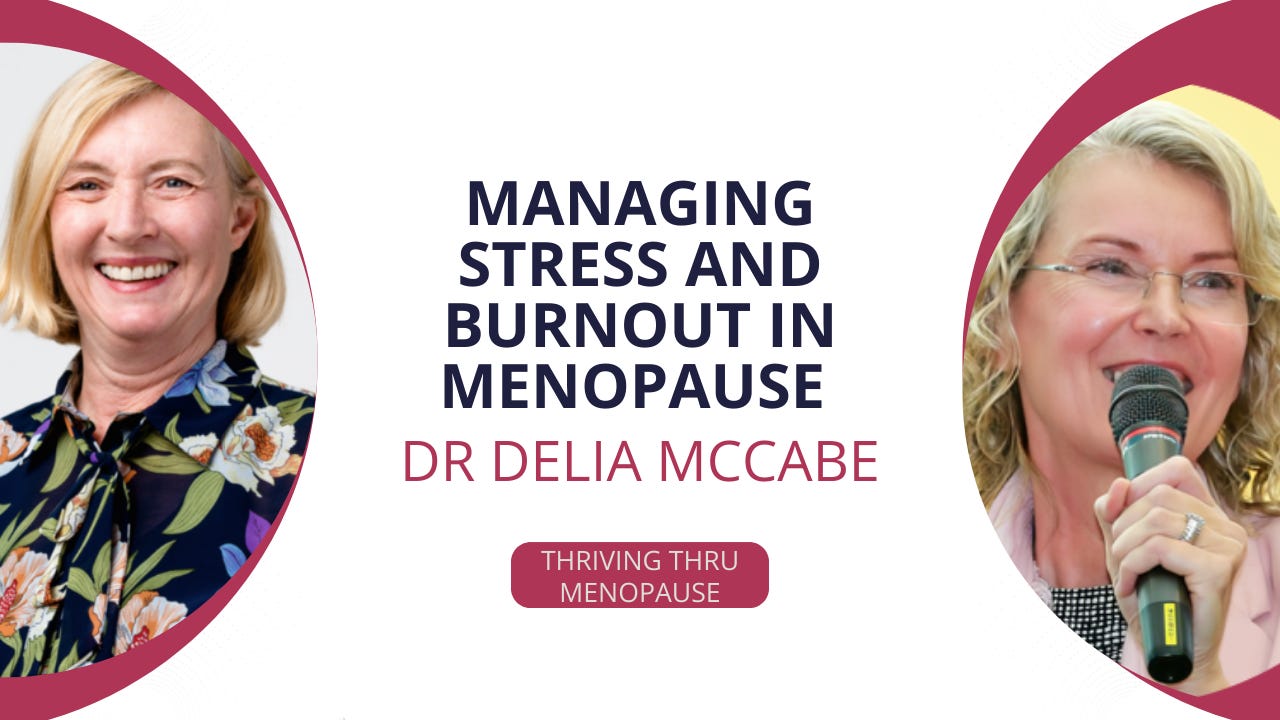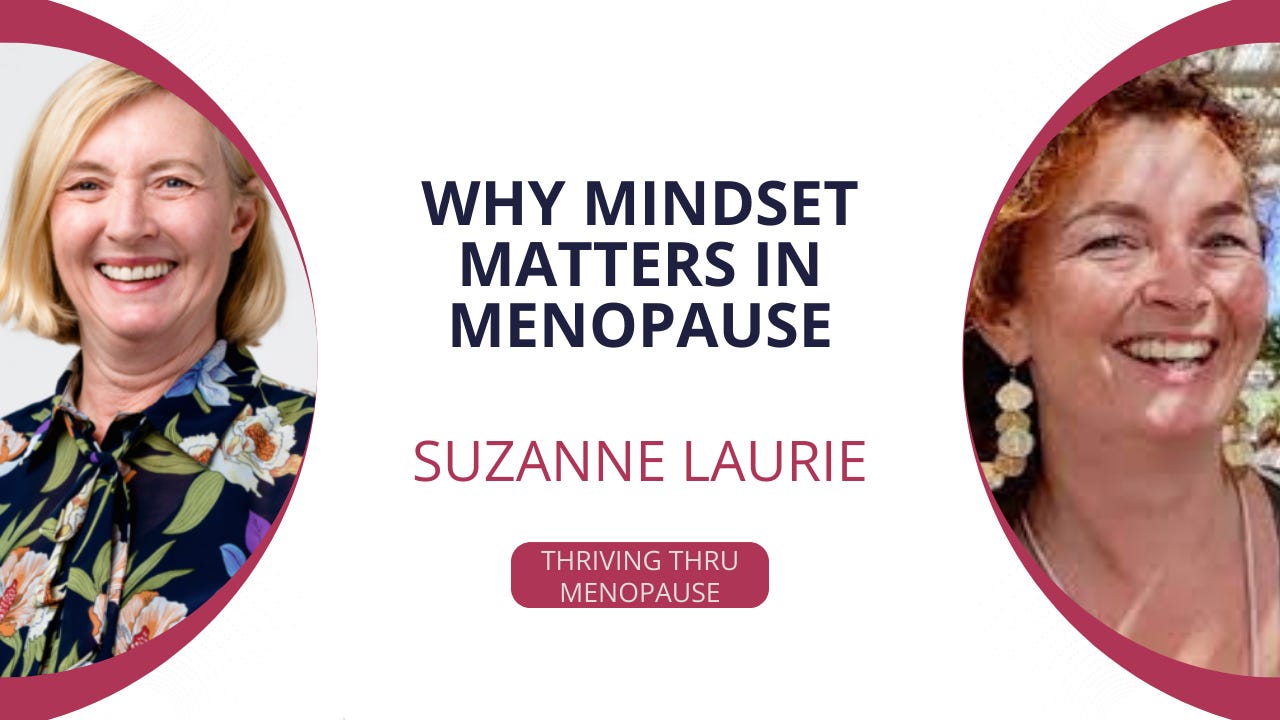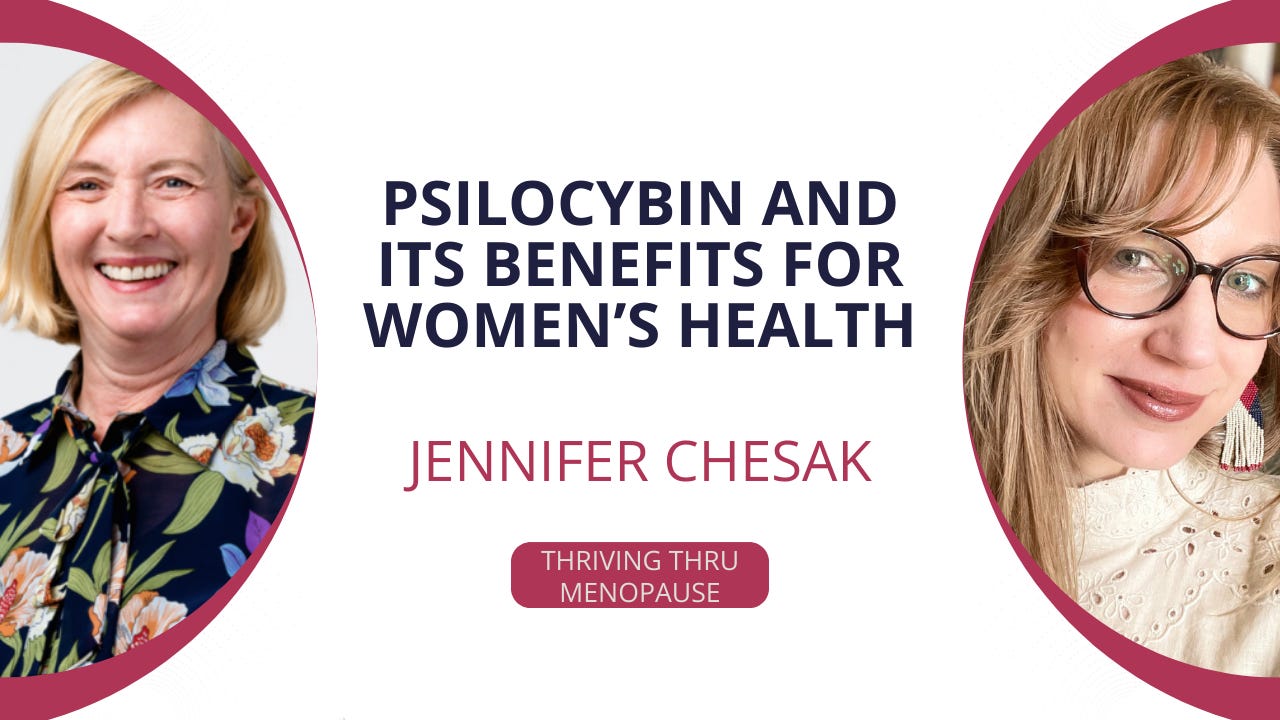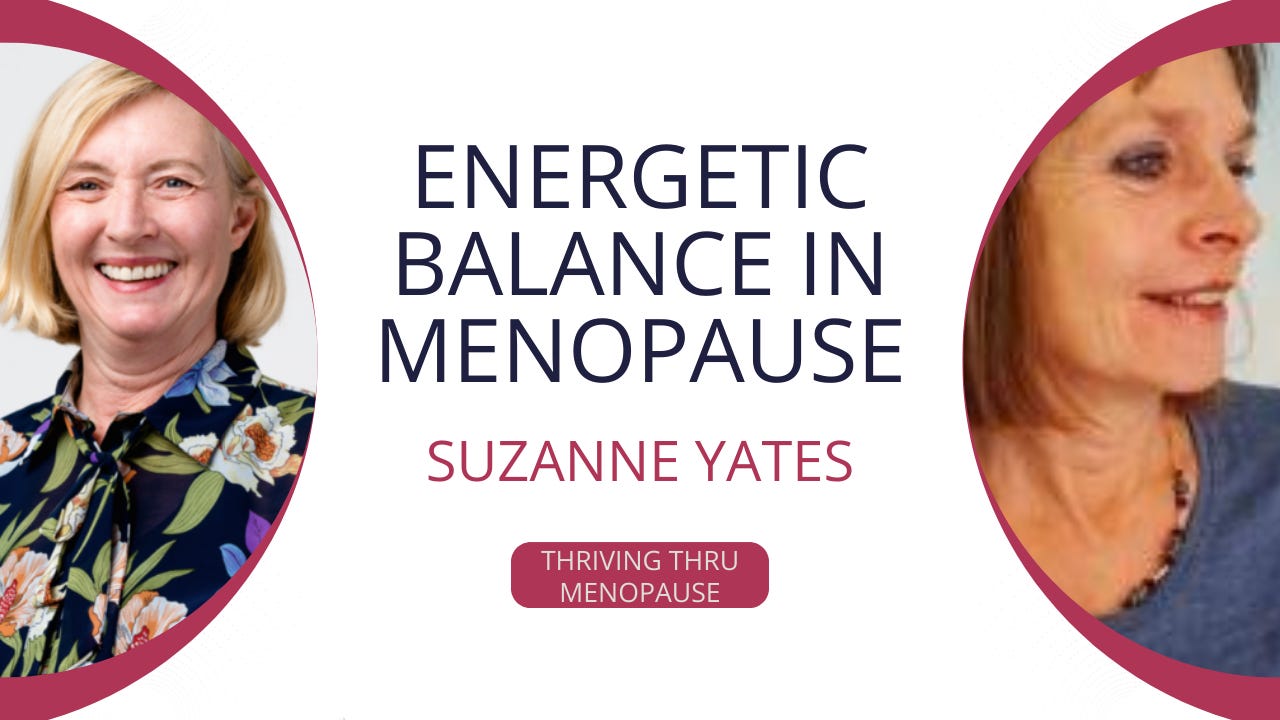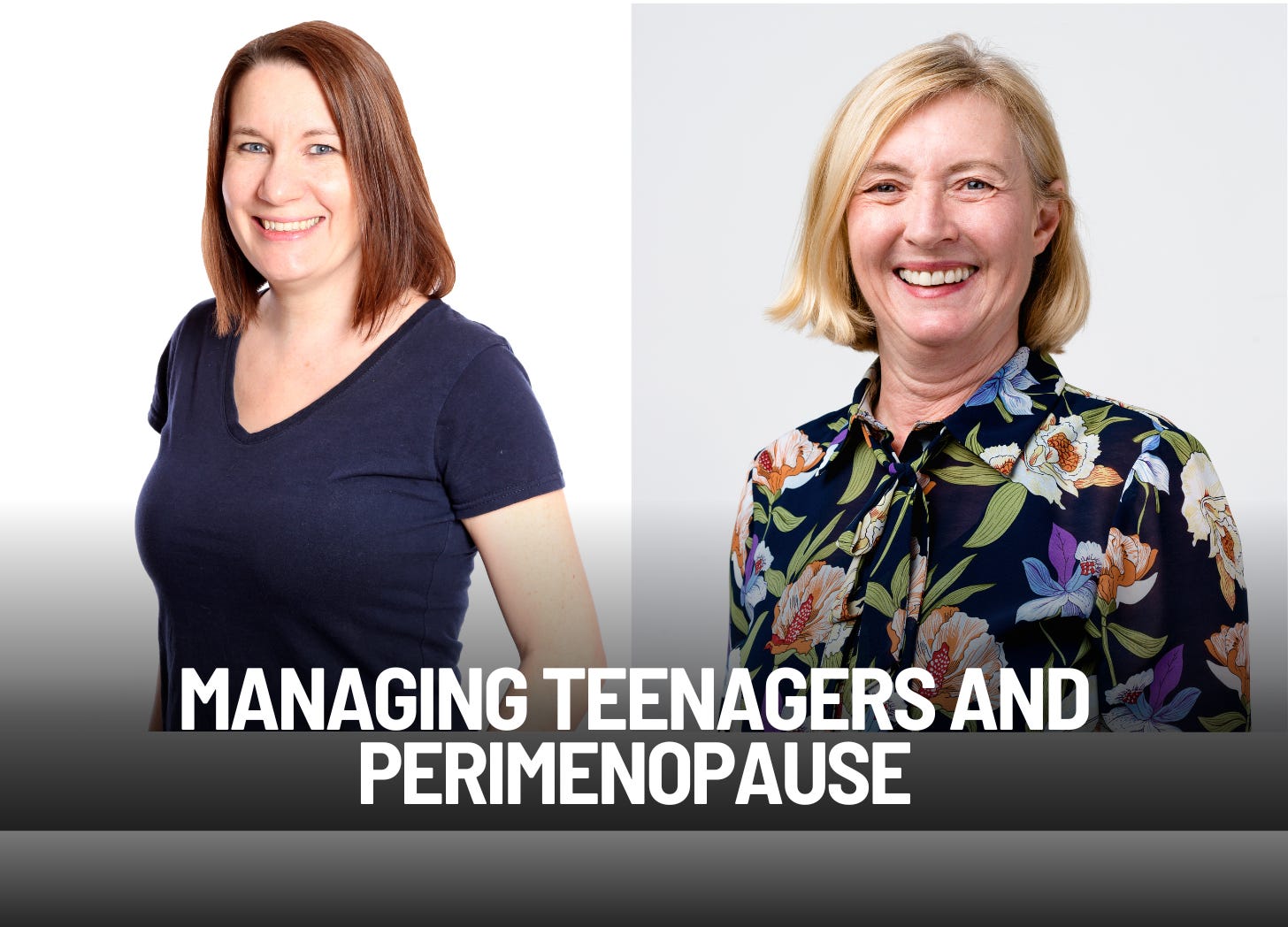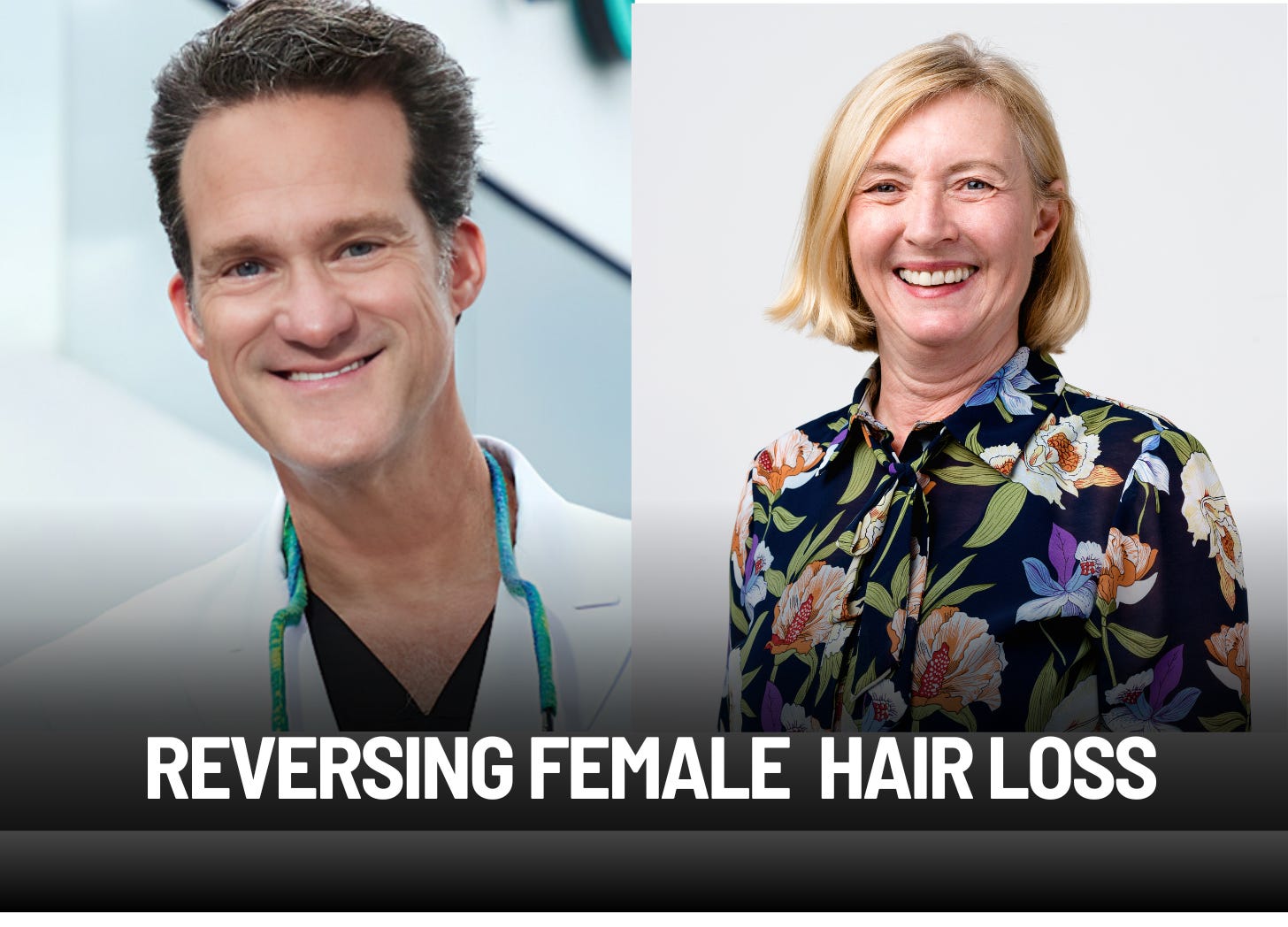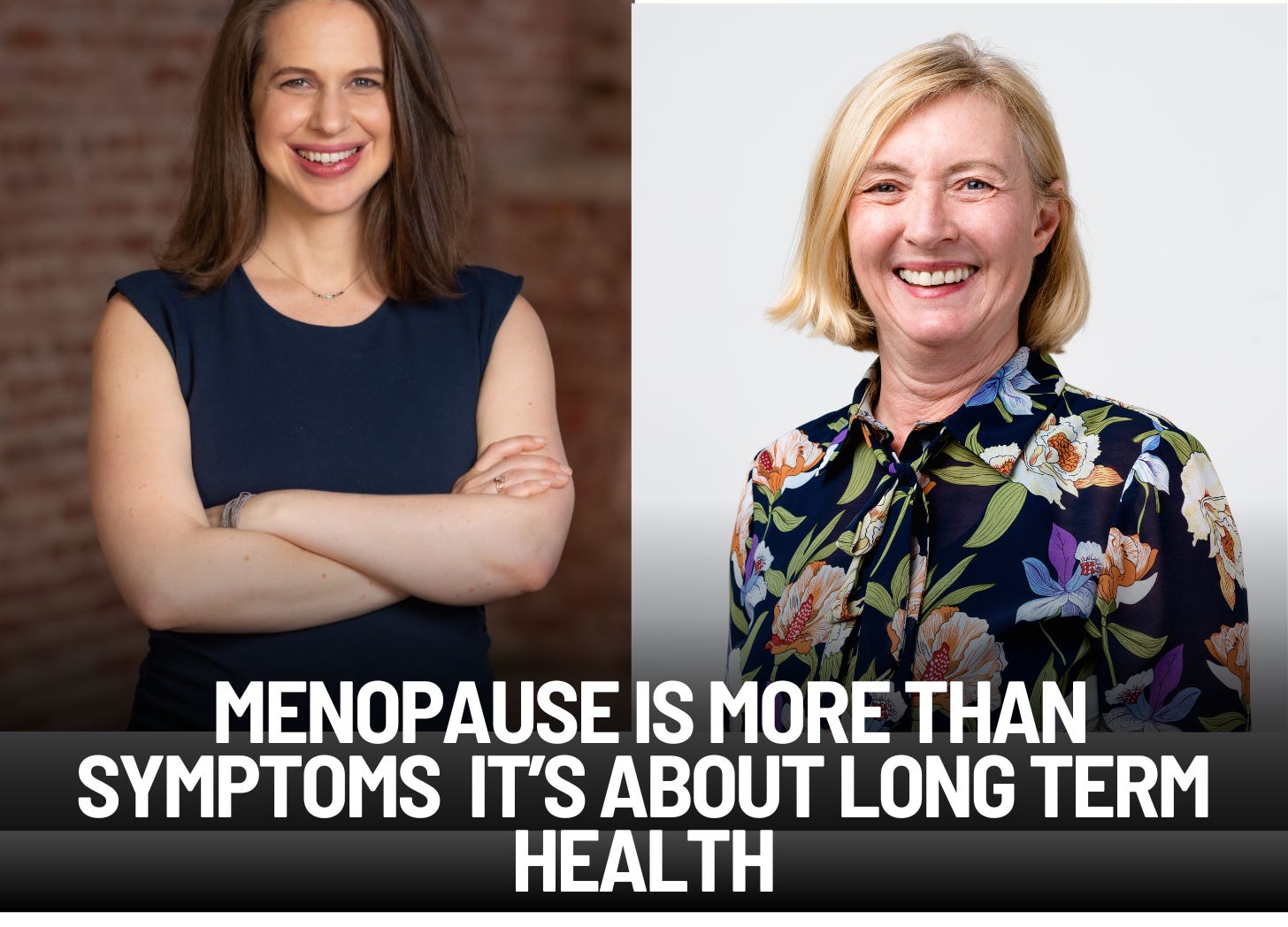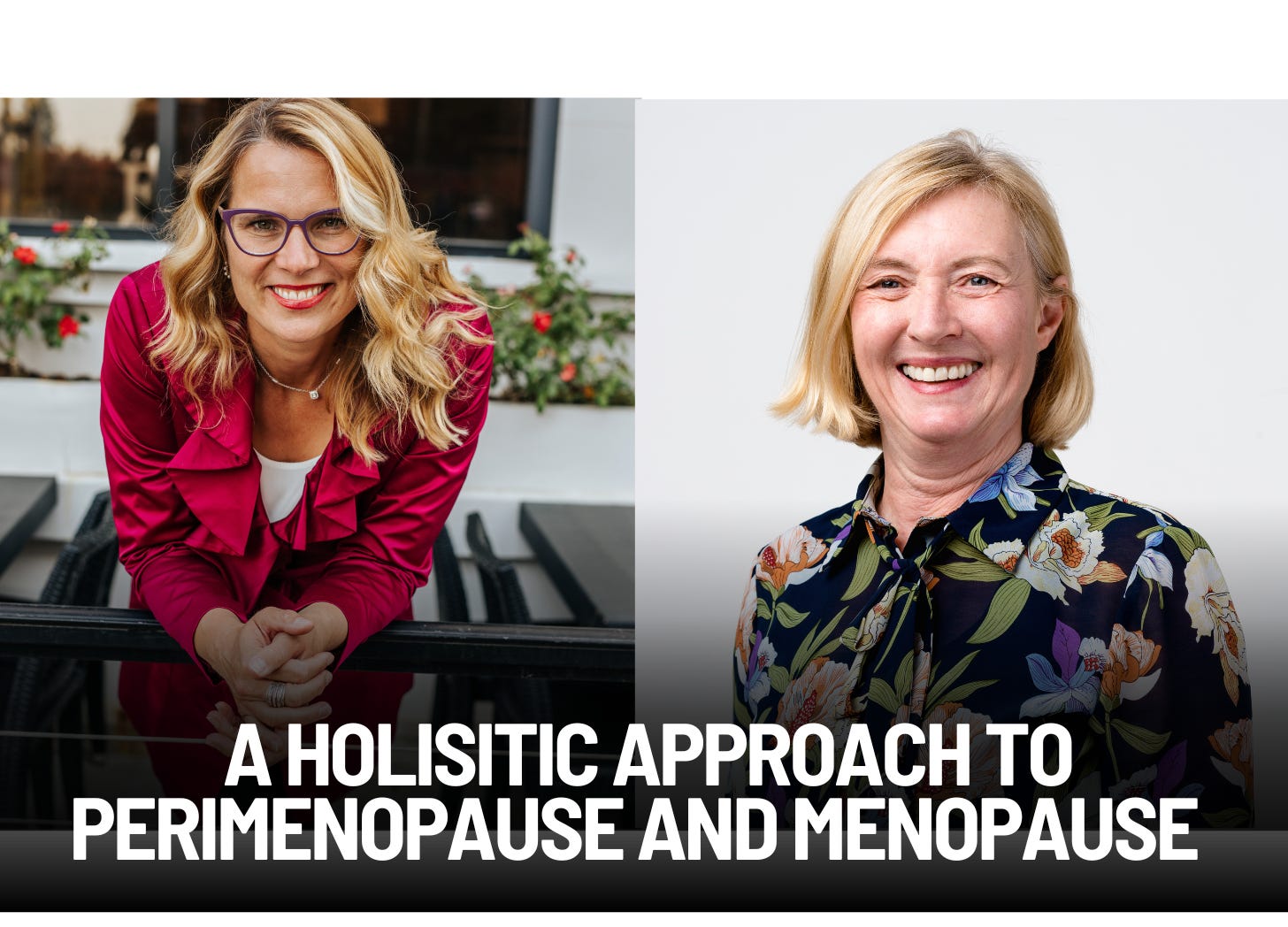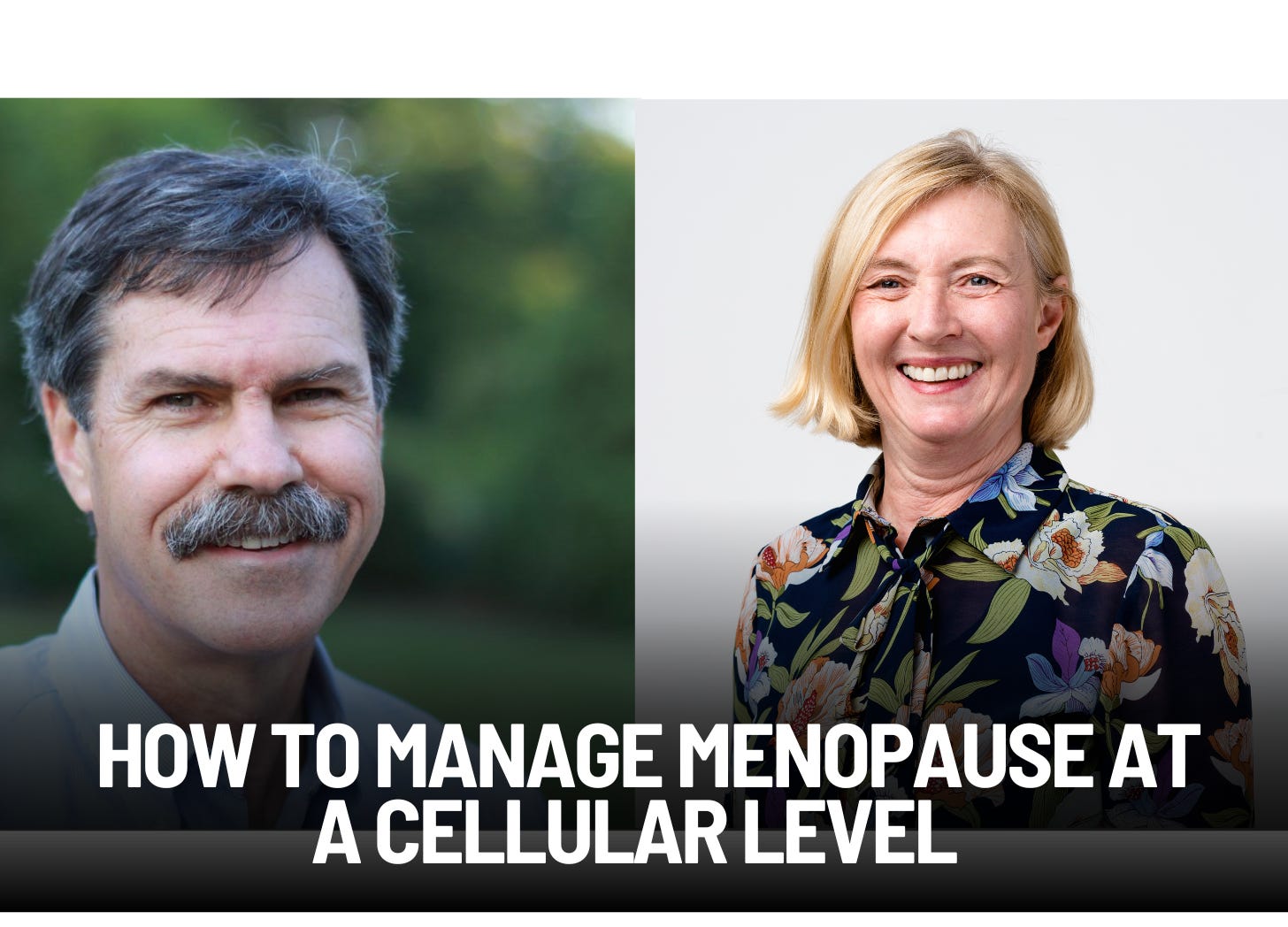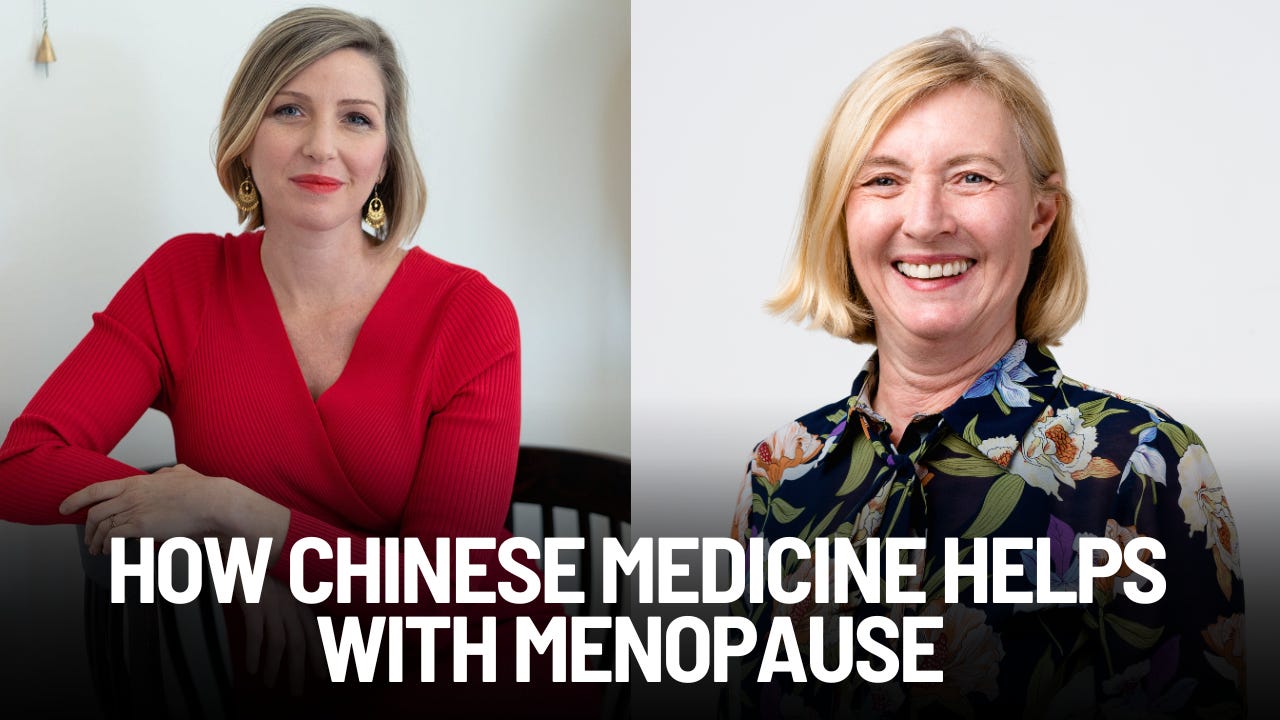Discover Thriving Thru Menopause
Thriving Thru Menopause

218 Episodes
Reverse
In this episode, Clarissa and Laurie Gerber discuss the challenges and changes in dating for menopausal women. They explore the importance of being ready for dating after divorce and the need to detox from past relationships. Laurie emphasizes the need to set personal rules and boundaries in the new dating world. They also discuss the impact of online dating and the role of pictures in attracting potential partners. The conversation highlights the importance of managing rejection and navigating the psychological gaming that can occur in the dating process. Dating coach Laurie Gerber shares her insights on dating for menopausal and post-menopausal women. She emphasizes the importance of the three Hs: head, heart, and hoo-ha, which represent practical compatibility, emotional connection, and physical attraction. Why Laurie advises setting a limit of three dates to determine if a potential partner meets all three criteria. She also emphasizes the importance of self-care, self-love, and being in a good mental and emotional state before entering the dating scene. Laurie encourages women to take control of their dating lives and approach dating with confidence and self-assuredness. Get full access to Heart of Menopause at clarissakristjansson.substack.com/subscribe
Today's episode is a MUST listen. If you are navigating #menopause and experiencing stress, sleep disruption, brain fog and beating yourself up for all of it, then this is for you. Cara Bradley joins Clarissa on the podcast today. She is a mind-body expert dedicated to advancing mind-body education through movement, mindfulness, and the science of human performance. Cara is the author of "On The Verge: Wake Up, Show Up, and Shine," and Mindful.org voted her one of the most powerful women in the mindfulness movement. Clarissa and Cara Bradley discuss the power of mindfulness in navigating menopause. They explore the impact of menopause on the brain and the importance of self-compassion during this transformative phase of life. Cara shares a three-step menopause and mindfulness practice that involves naming symptoms, examining them with loving kindness, and taking small actions to address them. They also discuss the role of mindfulness in managing brain fog and choosing one's state of being. The episode concludes with key takeaways and action steps for listeners to implement mindfulness in their own lives.TakeawaysMenopause is a prime time for women to awaken to their changing bodies, brains, and minds, and mindfulness can play a crucial role in this process.Mindfulness is the ability to know what's happening in the present moment without judgment, and it can be practised through formal meditation and moment-to-moment awareness.Self-compassion is essential during menopause, and simple practices like placing a hand on the heart can cultivate self-love and kindness.Addressing brain fog in menopause can be supported by mindfulness practices that help regulate the nervous system and prioritize sleep.Choosing one's state of being through mindfulness empowers women to navigate the challenges of menopause and embrace their wisdom and power.In this episode 08:48 The Impact of Menopause on the Brain 12:48 Understanding Mindfulness 18:43 The Importance of Self-Compassion 22:08 Practicing Mindfulness in Menopause 33:00 Addressing Brain Fog with Mindfulness 38:08 Choosing Your Mindset 45:21Action Steps to Start Being Mindful Get full access to Heart of Menopause at clarissakristjansson.substack.com/subscribe
In this episode of Thriving Thru Menopause , Clarissa interviews Junie Moon about shadow work and its importance in personal growth. They discuss the concept of the shadow, which refers to the parts of ourselves that we hide or disown. Junie explains how shadow work helps us reclaim and healthily express these hidden aspects. They also explore the impact of shadow work during menopause and how it can help women break painful patterns and heal generational shadows. Junie shares various tools and modalities for doing shadow work, including plant medicine and journeying. Takeaways Shadow work involves exploring and reclaiming the hidden aspects of ourselves that we have disowned or consider to be bad or wrong. Shadow work helps us break painful patterns, heal generational shadows, and express ourselves authentically. Menopause is a powerful time for shadow work, as it brings unresolved emotions and offers an opportunity for healing and transformation. Tools for shadow work include therapy, journaling, meditation, dream work, and working with plant medicine. Expressing and honoring our emotions is an important part of shadow work, as it allows us to heal and create a more fulfilling life. Shadow work can lead to a whole new way of being, where we embrace our true selves and live a more empowered and joyful life. Sound Bites01:13 Introducing Juni Moon: A Deep Dive into Shadow Work 02:26 Understanding Shadow Work: Unveiling the Hidden Parts of Ourselves 04:50 The Impact of Shadow Work on Personal Growth and Relationships 08:57 Navigating Midlife Challenges and Opportunities with Shadow Work 21:30 Exploring the Depths of Shadow Work: Techniques and Emotional Journey 32:45 Healing and Transformation: The Power of Shadow Work in Menopause Connect with Junie Moon https://midlifeloveoutloud.com/ Connect with Clarissa Kristjansson https://clarissakristjansson.com/ Grab Your Copy of the New Book Beyond Hormones 7 Holistic Ways to Thrive Through Menopause https://bit.ly/49XBI1a Get full access to Heart of Menopause at clarissakristjansson.substack.com/subscribe
In this episode of Thriving Through Menopause, OBGYN Dr. Cat Brown discusses the importance of women receiving proper treatment during perimenopause and menopause. She explains that the founders of Winona, a women's health clinic, started the clinic to address the access to care issue for menopause care. Dr. Brown emphasizes the gap in healthcare and the ongoing stigma surrounding hormone replacement therapy (HRT) due to negative information from the Women's Health Initiative study. She also highlights the need for healthcare providers to be more comfortable and knowledgeable about treating menopause symptoms. In this conversation, Dr Cat Brown and Clarissa discuss hormone replacement therapy (HRT) as a treatment for menopause symptoms. They highlight the benefits of HRT in managing physical symptoms such as hot flashes, low mood, and vaginal dryness. They also address the misconceptions and fears surrounding hormone therapy, including the use of bioidentical hormones and testosterone. Dr. Cat emphasizes the importance of finding a provider who listens to your concerns and offers evidence-based treatment options. They also discuss the need for reliable sources of information on menopause and HRT. Takeaways Access to care for menopause treatment is a significant issue, and telemedicine platforms like Winona are helping to make care more readily available. There is a gap in healthcare when it comes to women's health, and many providers dismiss women's symptoms due to a lack of comfort and experience with treating menopause. The negative information from the Women's Health Initiative study has created a stigma around hormone replacement therapy, leading to a reluctance among providers to prescribe it. Women should take an inventory of their symptoms and keep a symptom diary to share with their healthcare provider, as this information is invaluable in determining the appropriate treatment. Women experiencing brain fog and mental changes should recognize that these symptoms can be related to perimenopause and menopause. Women should focus on lifestyle changes, including exercise, nutrition, and sleep hygiene, to optimize their health during this transition. Bioidentical hormone replacement therapy (HRT) involves using hormones that are chemically identical to those produced by the body, while traditional HRT often uses synthetic hormones. Birth control pills are not an appropriate treatment for menopause symptoms, as they are designed to suppress ovulation and prevent pregnancy. Bioidentical forms of hormones are generally preferred, as the body better assimilates them and can be used at lower doses. SSRIs and antidepressants are often prescribed for menopause symptoms, but they are not frontline medications and may not address the underlying hormonal changes. Hormone replacement therapy (HRT) is an effective treatment for menopause symptoms, including hot flashes, low mood, and vaginal dryness. HRT can also have preventive benefits, such as reducing the risk of cardiovascular disease, osteoporosis, and dementia. Finding a healthcare provider who listens to your concerns and takes your symptoms seriously is important. Be cautious of providers who dismiss your symptoms or immediately prescribe birth control pills for menopause symptoms. Seek reliable sources of information on menopause and HRT, such as reputable medical websites and organizations. The Sound Bites 02:10 The Role of Winona in Women's Health 04:32 The Lack of Education on Menopause in Medical Training 05:13 The Intersection of Menopause and Women in the Workplace 06:41The Journey of Women at Winona 07:10 Taking Inventory of Symptoms 08:12 Tracking Mental Changes During Menopause 09:15 The Importance of Recognizing Perimenopause Symptoms 10:17 The Need for a Multi-Faceted Approach to Managing Perimenopause 11:30 Lifestyle Changes for Managing Perimenopause 13:42 Bioidentical Hormone Replacement Therapy 15:57 The Difference Between Bioidentical and Synthetic Hormones 19:43 The Benefits of Hormone Replacement Therapy 21:07 Different Forms of Progesterone 23:47 The Role of Testosterone and DHEA 24:18 The Use of DHEA for Vaginal Dryness26:21 Hormone Replacement Therapy as a Preventative Medication 29:07 Navigating the Confusion Around Menopause Information 29:22 What to Look for in a Menopause Provider 33:47 Finding Reliable Sources of Menopause Information 36:19 The Importance of Reputable Sources for Menopause Information 39:03 Accessing Resources on the Winona Website Connect with Winona https://bywinona.com/ Follow Dr Cat https://www.instagram.com/drcatobgyn/ Follow @thrivingthrumenopause https://www.instagram.com/thrivingthrumenopause/ Grab a copy of Clarissa's latest book Beyond Hormones: 7 Holistic Ways to Thrive Through Menopause https://bit.ly/49XBI1a Get full access to Heart of Menopause at clarissakristjansson.substack.com/subscribe
Homeopathy is a complete system of medicine that aims to promote general health by reinforcing the body’s natural healing capacity. It does not treat physical, emotional, mental, or even spiritual illnesses separately but regards them all as interconnected. In this episode, Clarissa Kristjansson interviews Tehilla Aloni, a homoeopath and founder of BioOrgonomy. They discuss the principles of homoeopathy, including treating the person as a whole and using minimum doses. Tehilla also explains how homoeopathy can be used to address menopausal symptoms and bring balance to the body. Additionally, Tehilla shares her work in bio-orgonomy, an extra-sensory technique that aligns energy fields in businesses. The conversation emphasizes the importance of aligning with one's purpose and the role of spirituality in achieving abundance and well-being.Takeaways* Homeopathy is a form of alternative medicine that treats the person as a whole and uses minimum doses of remedies.* A key principle of homoeopathy is treating the root cause of symptoms rather than just the symptoms themselves.* Bio-orgonomy is an extra sensory technique that aligns energy fields in businesses to promote success and well-being.* Aligning with one's purpose and holding the highest intentions can lead to abundance and fulfilment in life and business.Timeline01:30 Introduction to Homeopathy and Guest's Background09:06 Treating the Person as a Whole14:24 The Energetic Imprint and Minimum Dose16:18 Aligning with Purpose and Abundance21:26 Introduction to Bio-Orgonomy24:16 Aligning Interests in Business26:11 Overcoming Guilt and Focusing on the Positive31:54 Approach to Menopausal Issues35:45 Infusing Spirituality into BusinessConnect with Tehilla Connect with Clarissa Grab your copy of Beyond Hormones: 7 Holistic Ways to Thrive Through Menopause Get full access to Heart of Menopause at clarissakristjansson.substack.com/subscribe
In this episode of the Thriving Thru Menopause Podcast, Clarissa and guest Tracy Seider, a corrective exercise specialist and body alignment coach discuss the importance of proper body alignment, distinct from posture, and its influence on exercise, particularly strength training. Tracy shares her journey from a sedentary job to becoming a movement coach, emphasizing how ageing 'audaciously' is possible by addressing misalignments and movement patterns to avoid pain, increase strength, and improve overall health. The podcast underlines the critical role of alignment in preventing common menopausal issues such as sarcopenia, osteoporosis, and pelvic floor problems, offering a holistic approach that combines corrective exercise with everyday movement for lasting wellness.Key Takeaways•Alignment is crucial for menopausal women to optimize their exercise routines and overall health.•Our sedentary lifestyle and repetitive exercise routines can lead to misalignment and movement issues. •A different approach to exercise is needed during menopause to address the specific needs of women in this stage of life. •Good alignment has numerous benefits, including optimal loading of bones and muscles, improved breathing patterns, and better pelvic floor health. Proper alignment can make you feel younger and more in control of your body. •Alignment can improve physical appearance and create a younger-looking silhouette. •Proper breathing is essential and is affected by alignment. •Alignment plays a crucial role in core control and the functioning of the nervous system.•The psoas muscle is affected by alignment and can impact overall body alignment. •Taking a whole-body approach to alignment is important for optimal results. •Fascia is an important component of the body and affects overall health. •Incorporating movement into daily life is crucial for maintaining proper alignment. •Consistency and fun are key to maintaining an alignment practice. • Proper supervision is important, especially for individuals with limited range of motion.Timeline02:22 Meet Tracy Seider: From Editing to Alignment05:03 The Misalignment Dilemma: Understanding Our Bodies08:16 The Power of Proper Alignment and Movement10:49 A Personal Journey: Tracy's Transformation11:40 Aligning for a Better Future: The Reshape Method22:28 The Difference Between Alignment and Posture26:28 Unlocking the Secrets of Natural Movement27:01 The Ripple Effect of Alignment on Health28:18 Revolutionizing Your Body: The Power of Proper Alignment29:40 Breathing: The Unsung Hero of Well-being32:54 The Fascinating World of Fascia and Whole-Body Health35:26 Transforming Lives with the Reshape Method36:20 Embracing Movement in Everyday Life39:23 The Journey to Better Alignment: Starting Steps41:51 A Holistic Approach to Movement and Health44:50 The Importance of Personalized Guidance in MovementConnect with Tracy https://tracyseidercoaching.com/Connect with Clarissa https://clarissakristjansson.com/Grab a copy of Clarissa’s new book ‘ Beyond Hormones: 7 Holistic Ways to Thrive Through Menopause’ https://bit.ly/49XBI1a Get full access to Heart of Menopause at clarissakristjansson.substack.com/subscribe
This week, neuroscientist, psychologist, and expert in women's stress and burnout Dr Delia McCabe joined host Clarissa Kristjansson on Thriving Thru Menopause to discuss the complex challenges and stress women face, especially during menopause in the post-COVID world. They discuss the impact of stress, burnout, technology's influence, and information overload in today's society. Delia provides insights into the physiological differences in stress responses between men and women, emphasizing the need for effective stress management, creating new neural pathways, and simplifying life to enhance stress resilience. She explains how the complexity of the world and the information overload can overwhelm the female brain, leading to hormonal imbalances and emotional instability. The discussion also touches on the adverse effects of childhood experiences on stress levels and menopause symptoms. The importance of humour in navigating menopause and practical steps to reduce stress and improve overall well-being. Delia offers a seven-point checklist to help listeners build new neural pathways and manage stress more effectively. Delia provides actionable steps for women to thrive and improve their coping capacity. Takeaways * The world post-COVID is more complex and overwhelming, leading to increased stress and burnout among women. * The female brain is more sensitive to stress and hormonal fluctuations, impacting emotional regulation and well-being. * Choice fatigue and information overload contribute to stress and overwhelm, making it important to simplify life and focus on what can be controlled. * Addressing chronic stress and managing cortisol levels are crucial for preventing burnout and maintaining hormonal balance. * Adverse childhood experiences can make women more susceptible to stress and difficult menopause transitions.Timeline00:02 Welcome to Thriving Through Menopause Podcast01:32 Introducing Dr. Delia McCabe and the Importance of Support01:56 Navigating Stress and Burnout in a Post-COVID World04:00 The Complexities of Information Overload and Technology06:06 Understanding Burnout Beyond Work: A Modern Phenomenon06:35 Menopause in the Modern World: Challenges and Misinformation11:40 The Impact of Stress on Women's Health and Menopause18.20 The Effects of Hormonal Changes on the Female Brain 20.51 Addressing Chronic Stress and Choice Fatigue 25:12 Preventing Burnout and Managing Stress 33:10 The Relationship Between Adverse Childhood Experiences and Menopause 37:21 The Importance of Managing Cortisol Levels 40:14 Simplifying Life and Managing Stress for a Better FutureConnect with DeliaWebsite https://www.lighterbrighteryou.lifeChecklist https://www.lighterbrighteryou.life/7-point-checklist-to-feel-light-and-bright LinkedIn https://www.linkedin.com/in/dr-delia-mccabe/ Instagram @lighterbrighteryouFacebook lighterbrighteryouConnect with ClarissaWebsite https://clarissakristjansson.comInstagram https://www.instagram.com/thrivingthrumenopause/ LinkedIn https://www.linkedin.com/in/clarissa-kristjansson/ My book Beyond Hormones: 7 Holistic Ways to Thrive Through Menopause get your copy on Amazon. Get full access to Heart of Menopause at clarissakristjansson.substack.com/subscribe
Journey In this podcast episode, the host, Clarissa, interviews guest Suzanne Laurie, a nutrition therapist and positive psychologist specializing in menopause and perimenopause. The discussion centres on the importance of building mental resilience in the menopausal journey of women. They talk about the different causes of burnout in midlife women, such as work pressure, societal expectations, and dealing with major life changes. Suzanne emphasizes the significance of a positive mindset and robust social support systems in combating stress and maintaining good health. She also identifies ways to enhance resilience, including maintaining a balanced, nutritious diet, exercising regularly, practising mindfulness, and reducing stress. The conversation further explores the impact of societal ageism and sexism on the way midlife women perceive themselves and their health. They also discuss the potential of menopause as a pivotal and empowering life stage despite its challenges. The guest emphasizes the need for women to acknowledge the realities of ageing and to remember that perimenopause is part of a broader conversation about midlife female health.Timelines 00:02 Introduction to the Podcast 01:30 The Importance of Mindset in Menopause 01:49 Guest Introduction: Suzanne Laurie 04:10 Understanding Resilience 07:56 The Impact of Midlife Challenges on Menopause 18:03 The Importance of Self-Care and Delegation 24:03 The Role of Social Support in Resilience 29:37 Building Resilience Through Positive Mindset 36:58 Closing Thoughts and Guest Contact Information 38:51 Preview of Next Week's Episode Connect with Suzanne Laurie https://motherflushingmidlife.com/Connect with Clarissa https://clarissakristjansson.com/ My NEW book Beyond Hormones: 7 Holistic Ways to Thrive Through Menopause is now OUT, Grab Your Copy Here https://bit.ly/49XBI1a Get full access to Heart of Menopause at clarissakristjansson.substack.com/subscribe
Exploring the Potential of Psilocybin for Menstruation and Menopause.In this podcast episode of the Thriving Thru Menopause podcast, we talk about using psilocybin, a type of psychedelic compound, as a holistic approach to managing health conditions related to menstruation and menopause. I am joined by leading scientific journalist and author of The Psilocybin Handbook for Women, Jennifer Chesak. She highlights its effects on the brain and defines how it impacts mental structure and responses to beliefs. The potential benefits of women using psilocybin range from improving body image and mood enhancement to managing conditions like PMDD and PMS. Although clinical trials and research in this area are still underway, she emphasizes the need for the scientific community to consider psilocybin as a potential therapeutic solution in women's health. Key Points of the Conversations* Why a book for women?* Why/how does psilocybin work? Why are we seeing promising results through research?* How does psilocybin affect the menstrual cycle?* Can psilocybin help with menopause (depression, sexual dysfunction, overall symptoms)?* Any safety concerns?Timeline01:32 Introducing the Guest: Jennifer Chesak 01:57 Understanding Psilocybin and Its Benefits 03:48 The Role of Psilocybin in Women's Health 09:45 The Science Behind Psilocybin 18:19 Psilocybin and Indigenous Practices 24:06 Psilocybin and Women's Menstrual Health 28:28 Psilocybin and Menstrual Cycle: Timing and Energy Considerations 29:26 Fasting and Psychedelic Journey: A Menstrual Perspective 29:50 Understanding Macro and Micro Dosing 30:30 Microdosing and Menstrual Cycle: A Research Perspective 33:15 Psilocybin and Menopause: A New Hope 34:37 Psilocybin vs SSRIs: A Comparative Analysis 37:31 Psilocybin and Female Sexual Dysfunction 43:13 Psilocybin and Trauma: A Menopause Perspective 49:15 Safety Concerns and Considerations with Psilocybin 55:00 Final Thoughts and Future Prospects Jennifer Chesak Jennifer Chesak is the author of The Psilocybin Handbook for Women. She is an award-winning freelance science and medical journalist, editor, and fact-checker, and her work has appeared in several national publications, including the Washington Post. Chesak earned her master of science in journalism from Northwestern University’s Medill, and she currently teaches in the journalism and publishing programs at Belmont University.Website: https://www.jenniferchesak.com/ Clarissa Kristjansson Website https://clarissakristjansson.com/ The New Book Beyond Hormones: 7 Holistic Ways to Thrive Through Menopause is out this Friday 1st March. Get full access to Heart of Menopause at clarissakristjansson.substack.com/subscribe
In this episode of the Thriving Thru Menopause podcast, host Clarissa speaks with Suzanne Yates, an acclaimed international therapist, about menopause from a Chinese medicine perspective. Suzanne provides insight into the seven-year cycles in Chinese medicine that correlate to women's lives and how these stages affect menopause. They also highlight the importance of incorporating holistic practices such as Qigong and yoga to address the physical and emotional changes women experience during this phase. In addition, they touch upon the concept of Chinese medicine's Extraordinary Vessels and share simple exercises to maintain balance during menopause. Time stamps00:02 Introduction and Podcast Overview 01:47 Guest Introduction: Suzanne Yates 02:59 Suzanne's Journey into Chinese Medicine 06:36 Understanding Chinese Medicine and Women's Health 07:09 Suzanne's Personal Experience with Menopause 08:49 The Importance of Preparation for Menopause 13:06 Understanding the Seven-Year Cycle in Chinese Medicine 22:11 The Concept of 'Second Spring' in Chinese Medicine 29:11 Understanding Extraordinary Vessels in Chinese Medicine 32:12 Exploring Similarities in Eastern and Western Philosophies 32:30 Understanding the Central Channel in Our Bodies 33:17 The Balance Between Physical and Spiritual 33:48 The Importance of Energy Flow and Connection 35:22 Exploring the Concept of Vision in Life 35:33 The Impact of Menopause on Self-Expression 36:34 The Connection Between Physical and Emotional Health 36:51 Understanding the Girdle Vessel in Chinese Medicine 37:53 The Importance of Standing and Connection to Earth 38:59 The Role of Posture in Qigong 40:55 The Interconnection of Diet, Movement, and Breath42:32 Simple Exercises for Healing and Support 54:04 The Importance of Listening to Your Body 56:00 Conclusion: The Interconnectedness of All Things About this GuestSuzanne Yates is an acclaimed international therapist, teacher, researcher and innovator. A published author and expert in the field of pre and postnatal shiatsu and bodywork, she has taught doctors, midwives, nurses, shiatsu therapists and massage practitioners over the past 30 + years. Her speciality is women’s health at all stages.Through supporting pregnant women to be more connected with their body’s wisdom, she discovered the power of the Extraordinary Vessels of Chinese medicine to access deeply held memories.WebsiteInstagramYouTube Connect with ClarissaWebsiteInstagramEarly Access to the new book Beyond Hormones Get full access to Heart of Menopause at clarissakristjansson.substack.com/subscribe
Not all of us are parents, and some of us are small children; however, many of us during this time will have the collision of teenagers, their exams stress and our period/menopause.It can be a heady combination as I well know when I was in the throes of perimenopause with the Tom doing the Australian HSC - it brought us to tears many times.In this episode of the 'Thriving Thru Menopause' podcast, host Clarissa Kristjansson engages with Emily Hughes, a co-founder of the Parent Guide to GCSEs and the Parent Guide to Post 16. They discuss the stress revolving around school exams during the phase of menopause and strategies to manage it. During these candid conversations, Emily shares how the guides provide support for parents, the struggle of teenagers in adapting to the academic curriculum, and the unique challenges teachers face. Apart from being an informative source regarding GCSEs, the guides also assist parents in understanding and supporting their teenagers' emotional and hormonal changes. The episode also highlights the need for holistic approaches to tackling menopause symptoms and encourages parental participation in the podcast community. Show Notes00:16 Introduction to Thriving Thru Menopause 00:16 The Intersection of School Exams, Teenagers, and Perimenopause 00:41 Introducing Emily Hughes: The Parent Guide to GCSEs 01:08 The Importance of Holistic Approaches to Menopause 02:40 Emily's Journey: From Teaching to Creating Parent Guides 05:02 The Impact of the Pandemic on Education 05:45 The Challenges of Parenting Teenagers 06:08 The Stress of School Exams: A Global Perspective 13:20 Understanding the Teenage Brain and Its Development 17:13 The Role of Parent Guide to GCSEs 29:20 The Impact of Perimenopause on Parenting 34:26 Conclusion and Preview of the Next Episode Connect with Emily: https://www.parentguidetogcse.com/ https://www.facebook.com/parentguidetogcse Connect with Clarissa https://www.instagram.com/thrivingthrumenopause/ https://clarissakristjansson.com/ Get the opportunity to get early access to Clarissa's new book Beyond Hormones: 7 Holistic Ways to Thrive Through Menopause. subscribepage.io/thrivethrumenopause Get full access to Heart of Menopause at clarissakristjansson.substack.com/subscribe
If you are menopausal, then it is a possibility that you have gained weight. Typically, you can gain 5-8% of your baseline body weight in the first two years of menopause. Recently, it has become a popular trend: taking Ozempic for weight loss. It's a once-weekly injection that the FDA approved for use in adults with type 2 diabetes.Ozempic is not approved for weight loss. However, semaglutide is approved for weight loss under the brand name Wegovy.Ozempic can help people lose weight. However, experts recommend that people avoid using Ozempic for weight loss.In this episode of the Thriving Thru Menopause podcast, host Clarissa Hughes and guest Amy Wilson, a board-certified pharmacist and a certified fitness and nutrition coach, discuss the impact of menopause on women's health and how unhealthy quick fixes, like the medication Ozempic, may pose unforeseen risks. They emphasize the importance of holistic approaches to managing menopause, including sleep, exercise, and a balanced diet. They warn against the dangers of quick fixes, which may result in skeletal muscle mass loss and bone density reduction, potentially leading to severe health conditions like osteoporosis and sarcopenia.Furthermore, they express concern over the psychological effect of being dependent on quick-fix medications to maintain weight loss. Finally, they discuss the importance of healthy eating habits, proper hydration, and regular movement in maintaining wellness during menopause.The off-label use of Ozempic for weight loss is leading certain people to see you as a cash cow… and in Amy’s words YOU ARE BETTER THAN THATKey PointsKey Points 01:33 Understanding Menopause and Weight Gain 03:11 The Root Cause of Weight Gain During Menopause 04:52 The Impact of Dieting and Processed Foods 10:04 The Role of Hormones and Inflammation in Weight Gain 18:23 The Importance of Nutrition and Muscle Building 23:26 Practical Tips for Managing Menopause Symptoms 24:28 The Importance of Sleep and Establishing a Routine 26:12 The Impact of Sleep on Chronic Inflammation and Productivity 26:44 The Interconnectedness of Our Body Systems 27:11 The Foundations of Good Health 27:57 The Rise of Quick Fixes: A Look at Ozempic 29:04 The Pros and Cons of Ozempic 30:03 The Risks of Rapid Weight Loss and Muscle Wasting 33:12 The Psychological Impact of Weight Loss Medications 33:45 The Importance of Embracing Individuality and Healthy Body Image 35:26 The Risks of Gut Motility Issues and Potential Increase in Cancer37:03 The Dangers of Relying on Medications for Health 38:19 The Importance of Daily Health Maintenance 43:53 The Risks of Unregulated Medications and the Importance of Nutrition Connect with Amy amykwilson.com IG @thenutritioncoachpharmacist FB amywilsonfitness LI amy-wilson-rph-bcgpy YouTube @thenutritioncoachpharmaConnect with Clarissa clarissakristjansson.com IG @thrivingthrumenopause Get full access to Heart of Menopause at clarissakristjansson.substack.com/subscribe
Most women I know care deeply about their hair and invest significant time and resources in maintaining it. However, as women go through menopause, they may face unexpected changes in the density, texture, and growth of their hair due to hormonal changes. But take heart! This episode of the Thriving Thru Menopause podcast aims to provide knowledge and solutions to women struggling with these issues. Dr. Alan J Bauman MD, an expert in hair transplant surgery and hair loss treatment, is here to provide practical tips and advice on preventing and treating hair loss. His wealth of knowledge on hair restoration treatments and procedures can help women achieve fuller and healthier-looking hair. If you're experiencing hair thinning and loss, know that effective non-surgical hair restoration treatments are available that can help restore your hair's fullness and vitality. The treatments can range from lifestyle adjustments to advanced techniques like red light therapy, platelet-rich plasma treatment, medical-grade hair replacement systems, and future techniques like hair follicle transplantation using one's own preserved follicles. Dr. Bauman emphasizes the importance of nutrition and lifestyle factors in maintaining healthy hair and overall wellness. He shares valuable insights on how nutrition and dietary changes can impact hair health and suggests foods that can help support healthy hair growth. He explains how genetics, hormonal shifts, and environmental factors can lead to hair thinning and offers advice on maintaining healthy hair as women age. Dr Bauman also touches on the future of hair restoration, highlighting the potential of hair follicle stem cell banking.SHOW NOTES00:01 Introduction to Hair Loss in Women02:05 Understanding the Causes of Hair Loss03:13 The Impact of Hormonal Changes on Hair Loss11:13 Exploring Hair Loss Treatments13:35 The Role of Hormone Therapy in Hair Loss26:54 Hair Transplantation for Women30:16 Addressing Hair Loss in Cancer Patients36:21 The Future of Hair Restoration42:01 Conclusion and Final ThoughtsBaumann Medical https://www.baumanmedical.com/https://www.youtube.com/baumanmedicalhttps://www.facebook.com/baumanmedicalhttps://www.instagram.com/baumanmedical/Clarissa Kristjansson https://clarissakristjansson.com/https://www.instagram.com/thrivingthrumenopause/ Get full access to Heart of Menopause at clarissakristjansson.substack.com/subscribe
In this episode of the Thriving Thru Menopause podcast, Clarissa invites Dr Alicia Jackson, CEO and Founder of EverNow, a digital health company specializing in women's menopause and perimenopause health. They explore common misconceptions about menopause and perimenopause, highlighting the need for more comprehensive understanding and treatment options. Dr Jackson shares insights from their data-driven research on symptoms experienced by women, emphasizing the importance of individualized approaches in managing menopause. They also discuss the societal impact of menopause, particularly in the workplace and the urgent need for businesses to recognize and address this issue. The conversation concludes with a discussion about the offerings from EverNow and the value of maintaining an active and healthy lifestyle.Key Takeouts from Our Conversation: 1. Menopause is more than just symptoms - it's about your long-term health - brain, bone, and cardio-metabolic. 2. Symptoms start sooner than you think - as early as your late thirties and early 40's. 3. Often, symptoms associated with perimenopause and menopause aren't what you are thinking of Fatigue, sleeplessness, anxiety and depression. It's so much more than hot flashes.Show Notes00:00 Introduction to Menopause and Perimenopause00:46 Understanding Menopause and its Impact on Women's Health01:25 The Importance of Supporting the Podcast and Sharing its Messages02:46 Introduction to Dr Alicia Jackson and Her Work03:24 The Founding of Ever Now and its Mission04:15 The Impact of Menopause on Women's Health04:57 The Importance of Research and Data in Menopause Treatment05:56 The Need for More Inclusive Clinical Trials06:56 The Long-Term Health Implications of Menopause09:27 The Importance of Understanding Menopause Symptoms17:39 The Impact of Menopause on Women's Work Life22:27 The Silent Quitting Phenomenon in the Workplace26:20 The Importance of Female Leadership in the Workplace26:44 The Need for Menopause Support in Businesses29:07 The Role of Government in Women's Health33:00 The Impact of Menopause on Different Ethnic Groups40:44 The Importance of Personalized Care in Menopause43:21 The Role of Lifestyle in Managing Menopause48:53 The Future of Menopause Care with Evernow50:22 Closing Remarks and Preview of Next EpisodeListen on Substack, Apple, Spotify or wherever you listen to podcasts.Evernow Website https://www.evernow.com/ Follow Evernow on Social https://www.instagram.com/evernow/ https://www.facebook.com/EvernowHealth/ Clarissa Kristjansson https://clarissakristjansson.com/ Follow Clarissa Kristjanssson https://www.instagram.com/thrivingthrumenopause/ Get full access to Heart of Menopause at clarissakristjansson.substack.com/subscribe
In this episode of the 'Thriving Thru Menopause' podcast, host Clarissa welcomes Jennifer Woodward, a functional diagnostic nutrition practitioner and creator of FDN Business. They engage in an immersive discussion around holistic ways to manage perimenopause symptoms. Emphasizing the importance of a balanced diet, adequate rest, stress management, proper exercise, and thoughtfully utilized supplements, Jennifer details how making small changes can lead to transformative results in mood, energy, digestion, and hormonal balance. The duo also cautions against the use of supplements as quick fixes and encourages listeners to adopt a healthy lifestyle based on their ancestral roots. They highlight that weight issues can also be resolved by nourishing the body and calming the mind. Jennifer invites interested listeners to explore the Functional Diagnostic Nutrition self-paced certification program and her own services at Jennifer Woodward Nutrition.00:02 Introduction and Podcast Overview01:47 Guest Introduction: Jennifer Woodward02:21 Understanding Functional Diagnostic Nutrition03:29 The Role of Lab Tests in Hormone Therapy04:21 The Impact of Perimenopause on Women's Health09:04 The Importance of Diet in Managing Menopause Symptoms09:54 The Misconceptions about Supplements20:23 The Role of Stress in Perimenopause25:38 The FDN DRESS Protocol for Managing Perimenopause34:59 Conclusion and Contact InformationConnect with Jenniferhttps://jenniferwoodwardnutrition.com/https://www.functionaldiagnosticnutrition.com/Follow on Instagram https://www.instagram.com/jennifer_woodward_wellness/Want more support in menopause, connect with me https://clarissakristjansson.com/Follow me on Instagram https://www.instagram.com/thrivingthrumenopause/ Get full access to Heart of Menopause at clarissakristjansson.substack.com/subscribe
This week on Thriving Thru Menopause, I am joined by Dr. Bill Rawls, a board-certified OBGYN known for his holistic expertise in helping women manage menopause. Dr. Rawls shares his journey to alternative medicine, his personal battle with fibromyalgia and Lyme disease, and how his stressful situation led him to herbal practices. He explains how every human body's function is cellular, and maintaining cellular health is crucial.Drawing from his recent #1 bestselling book, The Cellular Wellness Solution: Tap Into Your Full Health Potential with the Science-Backed Power of Herbs, Dr Rawls discusses how our modern lifestyle and diet mean that crucial natural phytochemicals are missing from our diet — and how they are the key to protecting cellular health, an essential component to living and ageing well. Dr. Rawls discusses the benefits of combining low doses of bioidentical hormones with herbal therapy to manage menopausal symptoms. He also encourages women to adopt healthy habits like regular physical movements and consuming a whole-food diet to improve their health.Show Notes:00:00 Introduction and Guest Introduction01:49 Dr Bill Rawls' Journey to Holistic Medicine05:07 Understanding Cellular Wellness07:59 The Importance of Movement for Cellular Health18:01The Role of Herbs in Cellular Health23:31 The Impact of Modern Lifestyle on Cellular Health24:55 Herbal Medicine and Hormone Therapy in Menopause Management37:20The Importance of Foraging and Consuming Wild Plants39:54 Conclusion and Further ResourcesDr Bill Rawls Resources:Website: https://rawlsmd.com/ Instagram: https://www.instagram.com/rawlsmd/Book: Cellular WellnessClarissa KristjanssonWebsite: https://www.clarissakristjansson.comInstagram: https://www.instagram.com/thrivingthrumenopause/ Get full access to Heart of Menopause at clarissakristjansson.substack.com/subscribe
In this episode, I am joined by Kim Rahir, a former journalist turned health coach, a survivor of MS turned European Champion in Master Weightlifting - and on a mission to help middle-aged women embrace muscle and strength as the one-stop-shop solution for a host of health problems often from our thirties onwards. Her approach is to turn scientific knowledge about human health into actionable toolkits for everyday life.Kim Rahir shares her inspiring journey of managing her Multiple Sclerosis (MS) through strength training and its tremendous benefits to her life. After her MS diagnosis over ten years ago, she turned her situation around and even became the European champion in Masters weightlifting for her age group. Kim emphasizes the importance of resistance and strength training in managing many health and well-being issues of midlife women, including maintaining bone density, managing blood sugar, and enhancing physical strength and mental health. Additionally, she discusses how small, manageable steps in strength training can significantly transform the lives of many women, especially those in their midlife years, to become stronger and healthier. 00:00 Introduction and Guest Presentation 00:37 Kim's Journey with MS 03:35 Facing the Fear of MS 04:37 The Power of Living in the Moment 05:04 The Role of Exercise in Managing MS 09:40 Kim's Introduction to Weightlifting 13:48 The Impact of Strength Training on Health 17:51 Overcoming Resistance and Empowerment 20:48 Understanding Resistance to Physical Activity 21:25 The Evolutionary Reason Behind Our Sedentary Lifestyle 22:38 The Consequences of a Sedentary Lifestyle 23:16 The Importance of Reactivating Unused Muscles 24:26 The Challenges of Starting an Exercise Routine 25:31 The Initial Steps to Starting an Exercise Routine 27:05 The Importance of Starting Slowly and Building Strength 27:45 The Challenges of Exercising in Midlife 28:07 The Importance of Adapting Exercise to Our Age and Lifestyle 32:53 The Importance of Acknowledging Where You Are At 37:03 The Power of Small Steps and Consistency 40:32 How to Get in Touch and Start Your Fitness Journey Thriving Thru Menopause Social & Website Instagram: @thrivingthrumenopause Threads: https://www.threads.net/@thrivingthrumenopause LinkedIn: / clarissa-kristjansson Website: https://www.clarissakristjansson.com Kim Rahirhttps://kimrahir.comhttps://www.linkedin.com/in/kim-rahir/https://www.facebook.com/kim.rahir/ Get full access to Heart of Menopause at clarissakristjansson.substack.com/subscribe
How can slow living and botanicals help our skin in menopause? Chwynyn Vaughn of Slow Botanicals (Pronounced “Quinin”) joined me on @thrivingthrumenopause to talk about how botanicals can be healing and nourishing for our skin as we age.Chwynyn creates beautiful, handmade skincare products made from botanicals she grows in her organic garden and harvests in the wild, including flowers, plants, mushrooms, lichens, and seeds. Chwynyn's dedication to both practices is a part of her commitment to slow beauty. She shares Slow Beauty and how it is part of a broader slow-living lifestyle. Key Points in the Interview: * What is Slow Living 00:6:17 * Defining Slow Beauty 00:9:48 3. * How to use herbs internally and on your skin for maximum benefit 00:15:49 * Specific Skincare considerations for perimenopause and menopause 00:19:38 * How to align your skin care with circadian rhythms 00:23:30 You can find Chwynyn sharing her insights on slow beauty and skincare on the blog at Slow Botanicals and receive her free download with practical tips on creating your Slow Beauty Morning Ritual. https://www.slowbotanicals.com/Subscribe to Heart of Menopause for more weekly information on managing menopause holistically.Listen to this podcast on any of your favourite apps.Check out my online course, Thrive and get on the list for my upcoming Women’s Wisdom series on managing peri/menopause from a traditional Chinese Medicine perspective. Get full access to Heart of Menopause at clarissakristjansson.substack.com/subscribe
As we age, it becomes increasingly difficult to become the "I can do anything" woman we aspire to be, especially after menopause. This week, we have Kelly Howard, the Fitness Consistency Expert, joining us to discuss how women can prioritize their fitness and feel great in the second half of their lives. Kelly shared her secrets to fitness: * Why consistency is the key to achieving long-term fitness goals* How starting small can be smart for beginners* Why your brain is your biggest fitness asset * Overcoming common myths about fitness * How adventure can be incorporated to achieve fitness goals With 2024 just around the corner, this episode is an excellent resource for those who want to get active, fit, and even step out of their comfort zone. Kelly Howard is the fitness consistency expert with a touch of adventure, founder of Fit is Freedom, host of the Fit is Freedom Podcast, and bestselling author of FIT: Active & Ageless for Life.For over 25 years, Kelly has helped thousands of women prioritize their fitness so they can feel great and have more fun in this second half of life. She loves helping women get active, fit, and out of their comfort zone (if they’re willing).Listen to the podcast anywhere you listen to podcasts.Subscribe to Heart of MenopauseIf you are looking for more support in menopause, connect with me Get full access to Heart of Menopause at clarissakristjansson.substack.com/subscribe
Join host Clarissa Kristjansson as she dives into holistic wellness with Dr. Christina Burns, a distinguished Doctor of Eastern Medicine and Herbalist specializing in women's health and fertility. With a wealth of experience featured in publications like Forbes, Entrepreneur, NY Post, and Bustle, Dr. Burns brings a unique perspective to menopause management. This week's episode explores the realm of Traditional Chinese Medicine (TCM) ‘s invaluable role in helping women flourish during menopause. Dr. Burns, who has immersed herself in mindfulness and Eastern medicine in remote areas of China, India, and Nepal, sheds light on the physiology of menopause and its impact on hormones, mind, skin, hair, and metabolism. Discover how acupuncture can be a powerful ally in navigating the menopausal journey. Dr. Burns shares her expertise on the profound effects of Chinese herbs, providing natural solutions to enhance well-being during this transformative phase of life. Whether you're seeking personalized mind-body programs, informed nutrition, or lifestyle management tips, our guest's wellness institute in NYC is dedicated to empowering women on their path to optimal health. Tune in for a captivating conversation on menopause and the role that Traditional Chinese Medicine can play in women's health at this time. You can connect with Dr Christina Burns at Naturna Life and get a copy of her book "The Ultimate Fertility Guidebook" You can listen to this podcast here on Substack or on any of the apps you listen to podcasts on or go theThriving Thru Menopause YouTube ChannelDo subscribe to Heart of Menopause, where I share weekly guidance on managing menopause holistically.Discover more about my coaching programme Thrive in Menopause and my 1:1 Qigong sessions over on my website Get full access to Heart of Menopause at clarissakristjansson.substack.com/subscribe



